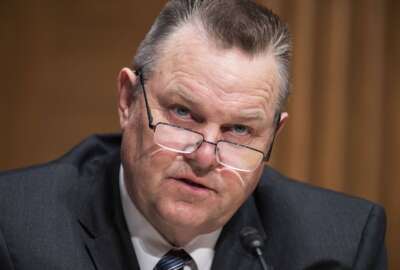VA signs new labor agreement with AFGE, its first update in more than a decade
The Department of Veterans Affairs and the largest federal employee union have finalized a new labor agreement, putting an end to more than six years of stalled...
The Department of Veterans Affairs and the largest federal employee union have finalized a new labor agreement, putting an end to more than six years of stalled contract negotiations.
VA and the American Federation of Government Employees leaders signed a master collective bargaining agreement Tuesday, updating the terms of their labor contract for the first time in more than a decade.
The new agreement between VA and AFGE closes one of the most contentious chapters in recent federal labor relations history.
VA Secretary Denis McDonough told reporters Tuesday that the new contract will help with “easing the process by which we can fill vacancies,” and will allow the department to make new hires more quickly.
“We’ve made hiring a priority since we got here, so we’re looking for every efficiency we can find to improve that process,” McDonough said at the VA Medical Center in Salem, Virginia, where the signing ceremony took place.
The new contract allows the VA to speed up the hiring process and staff up more quickly, as it prepares to accommodate a historic expansion of VA health care and benefits under the PACT Act.
But aside from those hiring changes, the agreement is largely a rollover from the 2011 contract.
“Together we listened to each other, we worked together, we focused on modernizing and improving VA’s hiring, preserving VA employee rights, fostering a positive and collaborative labor-management relationship. Now all of that is manifest in this contract,” McDonough said.
McDonough said the new contract will make it a “lighter lift” for the department to announce vacant positions, but said some of VA’s hiring challenges fall outside the scope of the labor agreement.
“The challenges we’ve had with hiring are not entirely, or even mainly, a function of the last contract, but there were some things that we were able to tighten down in this timeframe,” McDonough said.
AFGE National President Everett Kelley said the new contract reflects compromises made by both parties, but added that the final deal will lead to better outcomes for VA employees and the veterans they serve.
“The message is clear that when the union and management work together, we can accomplish much. Much has been accomplished here, when you look at this contract,” Kelley said.” It’s going to be better for the employees, it’s going to be better for the agency, it’s going to be better for our communities.”
VA’s Deputy Director of Labor-Management Relations Kurt Martin, the department’s chief negotiator during contract talks, called the agreement a “stepping stone toward enhancing our workforces stability and growth, by fostering a positive and productive work environment.”
“We aim to better retain employees and to attract new talent to join our ranks. New, streamlined hiring processes in this agreement will enable VA to expand its staff and ensure that it can meet the ever-growing demands of those who have served our country,” Martin said.
‘End of a long road’
VA and AFGE announced they reached a tentative agreement on a new contract in April.
Contract negotiations reopened in December 2017, but VA and AFGE still struggled for years to reach a deal to amend the previous collective bargaining contract, which dates back to 2011.
Contract negotiations came to a standstill during the Trump administration, with a 2020 decision from the Federal Service Impasses Panel, which made cuts to official time and other provisions favoring management.
AFGE National VA Council (NVAC) members chose not to ratify the decision, and negotiations remained on hold until a July 2021 settlement with AFGE, in which VA agreed to restore official time for its health care workforce and remove other provisions from the 2020 decision.
In early 2022, VA and AFGE returned to the bargaining table, reopening a few articles of the overall contract for negotiations.
Those negotiations progressed quickly, after a federal arbitrator in March ruled in favor of AFGE, and pushed VA officials to stop negotiating “in bad faith.”
That decision came after the union filed a national grievance claiming that VA negotiators had violated the established ground rules by attempting to negotiate provisions outside the set scope of the contract negotiations.
AFGE NVAC President Alma Lee said the 2023 national agreement “marks the end of a long road” between VA and the union.
“We always knew the work of a union representative would never be finished. But my oh my, these last six years have shown us all what it means to never give up and keep fighting,” Lee said.
AFGE NVAC represents more than 300,000 employees across the VA. More than 79% of VA’s employees belong to a union.
Kelley said AFGE entered into a new era of negotiations with the Biden administration.
“There were some disagreements, but what I’m grateful for is the fact that we had a new administration come in, and a new secretary that listens. When we have people that listen, then we were able to get the job done,” Kelley said.
“We want to be a model employer for the federal government. That means taking care of the people who take care of our veterans,” McDonough said.
McDonough said the VA is “on a full-court press to hire” as it implements the PACT Act.
The Veterans Health Administration hired more than 43,000 new employees so far in fiscal year 2023, and is on track to meet its year-end goal of making 52,000 new hires.
The VHA workforce has grown by 4.9% so far this fiscal year, on track to beat its goal of 3% growth.
The Veterans Benefits Agency also has more than 30,000 employees, its largest workforce in its history.
The VA is ramping up its workforce under the PACT Act, which expands VA health care and benefits for veterans exposed to toxic substances during their military service.
The legislation gives the VA more than 10 new authorities to support hiring and retention. Those include higher limits for student loan repayments, recruitment, relocation, and retention incentives, and eliminating statutory limits on awards and bonuses.
“There’s more for us to do for our frontline employees,” McDonough said.
VA ‘using the authorities we have’ to fire poor performers
While VA and AFGE are focused on steps to grow the workforce, both parties say they have the resources to fire VA employees facing allegations of misconduct or poor performance.
Senate VA Committee Chairman Jon Tester (D-Mont.) recently introduced a bipartisan bill that would standardize the way the VA builds a case against employees who face allegations of misconduct or poor performance, and to train the entire VA workforce on the ins and outs of the process.
That bill takes a different approach from the Restore VA Accountability Act that the House VA Committee recently advanced.
Top Republicans on the House VA Committee introduced their bill after the VA announced it is no longer using authorities in the 2017 VA Accountability and Whistleblower Protection Act to expedite the removal of its employees.
VA leaders say the 2017 law didn’t help them fire poor performers, and that federal judges and the Merit Systems Protection Board blocked many of the legislation’s provisions from covering a majority of its workforce.
“We believe that we have the authorities to move with dispatch when our providers are not focused, first and foremost, on veteran-centered outcomes,” McDonough said. “What I aspire to is using the authorities we have in a way that allows us to manage our departments, rather than continuing to find us in front of administrative bodies, in front of federal courts, which ends up being a diversion of our time and resources.”
Kelley said AFGE has “always advocated to make sure that employees were performing at their best.”
“We have very patriotic employees, that they want to do the job. They want to do good every single day. So this contract didn’t really have to address that concern because that concern was already being met. The administration has already made sure that we don’t protect poor performers. We expect them to get the job done, we expect them to do their job. And every single day we set out to be sure that happens,” Kelley said.
Copyright © 2024 Federal News Network. All rights reserved. This website is not intended for users located within the European Economic Area.
Jory Heckman is a reporter at Federal News Network covering U.S. Postal Service, IRS, big data and technology issues.
Follow @jheckmanWFED






